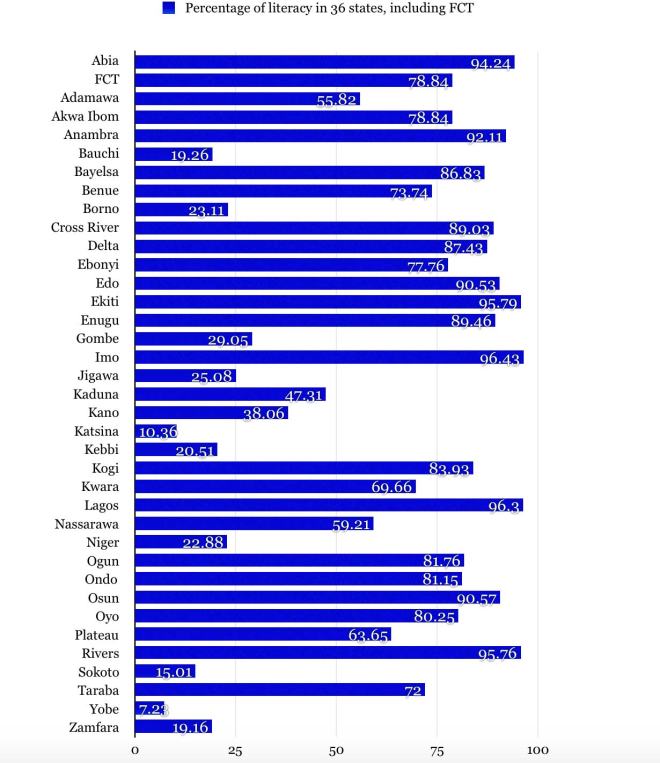
‘’Three million children are out of school in the North of the country but there is not enough funding for schools and teachers. Digital Innovation can help us think beyond the conventional ways to solve this problem’’ H.R.M Mallam Muhammadu Sanusi II Former CBN Governor and Emir of Kano while speaking during the 25th Nigerian Economic Summit Group held recently.
There are over 3 million Almajiri children studying in Koranic schools across Northern Nigeria who need to be absorbed into the formal education sector.
Former President Goodluck Jonathan established special schools for the Almajiri to get Western education integrated with their Islamic education.
Currently there are about 10.5 million school aged children out of primary school in Nigeria with a sizable majority found in the northern region. The girl child isn’t encouraged to be educated unlike her peers in the southern region due to cultural and religious beliefs. Disparity has seen the South lead the North with a literacy level of 67 percent to 34 percent.
Tekedia Mini-MBA edition 14 (June 3 – Sept 2, 2024) begins registrations; get massive discounts with early registration here.
Tekedia AI in Business Masterclass opens registrations here.
Join Tekedia Capital Syndicate and invest in Africa’s finest startups here.
The Governors of the region over the past 20 years since the return of democracy received grants to develop the basic education sector with little or nothing to show for it, as they have the worst results among all the states of the federation in National and Continental Examinations. The major problems affecting basic education in the North include poor quality of learning facilities, teachers , number of pupils per class and efficiency of learning supervision to achieve positive outcomes.
Former Governor Kashim Shettima of Borno State established over 40 state of the art mega schools to cater for orphans who lost their parents as a result of the decade-long Boko Haram insurgency which has wrecked the socio economic development of the state. Among such schools is the Aisha Buhari Integrated School for Fulani named after the First Lady, a primary school with 24 classrooms and 40 preschool which runs morning and afternoon sessions with free bus rides to convey the Fulani children to school from their homes. They are served breakfast and lunch as a means of encouraging them to attend school. It is equipped with eco-friendly cooking stoves which can cook for as much as 300 people at once, a water chiller with power provided by a 33 KVA generator and solar energy.

Another strategic intervention is The Northern Education Initiative Plus Project which commenced in October 2015 with funding support from the United States Agency For International Development, a five year project aimed at strengthening the ability of Bauchi and Sokoto States to provide increased access to basic education, especially for girls and Out Of School Children, and to significantly improve learning outcomes for more than one million school aged children and youths. It employs a holistic approach addressing a broad range of critical factors that affect learning, teaching, systems management, parental participation and community engagement. The project strategy focuses on strengthening the technical and administrative capacity, commitment and accountability of federal, state and local government authorities to provide effective English and mother tongue based early grade reading, teaching and learning to its pupils. Also to deliver literacy, numeracy and life skills to out of school children and youths and whenever possible onboard them to formal educational institutions.
The project provides innovative cost effective ICT solutions for facilitating mobile money payments for learning facilitators, improve coaching and mentoring systems for teachers/learning facilitators and maintains an efficient teaching and learning materials supply chain, helps in capacity development for local education authorities to plan, budget and administer schools, support and supervise teachers, deliver high quality teaching learning materials and mobilize community involvement for increased enrolment and to improve learning outcomes.
It is training and equipping Colleges of Education to include early grade reading concepts, techniques, practices and materials in their curriculum, while playing a key role within the education sector to promote the EGR policy and research. It constantly monitors program activity and assesses its delivery and results against established targets and milestones to improve project outcomes. The initiative is expected to demonstrate significant improvement in EGR for approximately one million children in schools and over 400,000 out of school children attending some 11,000 non formal learning centers, adolescent girls learning centers and youth learning centers.
There is a nexus between the high insecurity in the Northern Region and poor human capital development. The current Emir of Kano Mallam Muhammadu, Sanusi II a strong champion for girl child and quality education in the Northern region, has spoken of the need for its political class and philanthropists to invest in education.
A redesign is urgently needed to scale access to quality education in the region as funding for schools and teachers is not enough. Utilization of technology can help in fixing this friction. Basic education teachers in the various states of the region should be trained on modern digital tools which are being used to deliver quality education across the globe. With Artificial Intelligence tutors, the Almajiri and other millions of educationally disadvantaged children can learn subjects in English and Hausa Languages to improve their understanding through customized tablets while Augmented Reality can be used in helping them understand the sciences.
Lagos based CoCreation Hub recently established an Education Technology Centre of Excellence at Tai Solarin College of Education to transform learning outcomes in public educational institutions across Nigeria in line with 21st Century standards. The Governors of the Northern Region and other zones across the country should partner with the Centre of Excellence to transform their educational deficiencies to create globally competitive youths for the Fourth Industrial Revolution.



